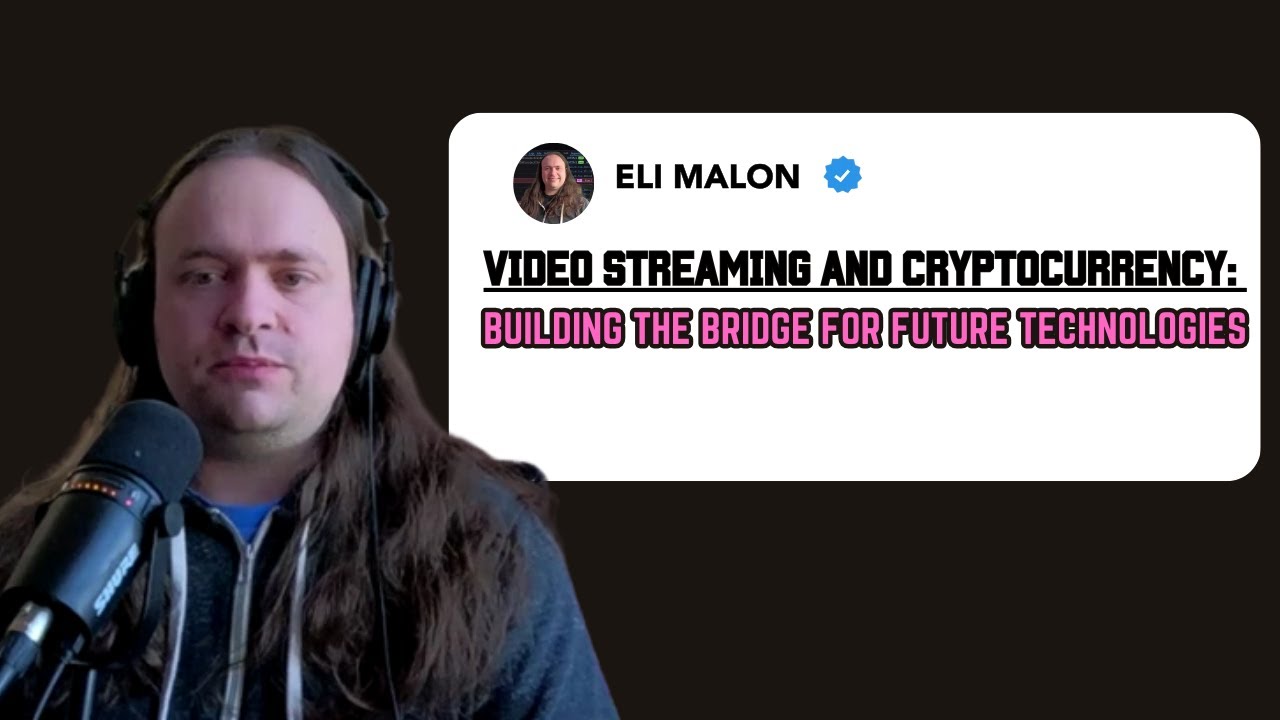Eli discusses the challenges and strategies for monetizing decentralized platforms, focusing on Live Peer Network’s video infrastructure. The conversation touches on the benefits of centralized platforms for business control and how decentralized networks like AT Protocol could integrate micropayments to support creators. The use of cryptographic primitives and cryptocurrencies is explored, with a balanced view on their integration into decentralized platforms despite community resistance. The discussion highlights the potential for cryptocurrency-based micropayments to succeed, the cultural resistance to such monetization, and the importance of preparing for their inevitable adoption.
Uh so centralized platforms are just generally easier to monetize. Um you know for for better or worse like they’re centralized because that makes a good business. You can have a lot of control over not just like technical decisions but like over the presentation and like where it shows up and how content is shared and like all these things. And you know, one of the key things in in what you’re saying here, like kind of what you want to build is like more agency for people to like maybe you want to embed your stream on your site and you know, all these other things, but you’re integrating with the Live Pier network for video transcoding, video is even though you’re like doing something that’s technically a lot cheaper than the status quo, it’s still, you know, not free. It’s still like a potentially expensive thing. So as you’re going through this journey, how are you thinking about uh revenue, managing costs, like what the shape of the business looks like while still achieving sort of your like in like social and technical goals? Yeah. Yeah, it’s a great question. Um and it very much an open question for the entirety of the app protocol ecosystem where uh there’s been a couple uh you know blue sky well funded and we saw grays and skylight both receive some sort of seed funding. Um and then us of course from the treasury but uh to my knowledge that’s the end of the list. Not a lot of people are really are really figuring out how to how to get paid doing this yet. And of course, that’s particularly important to us, building live video infrastructure, which is arguably the most expensive thing you can you can possibly do. Um, Twitch got to where it is by uh being, you know, Amazon’s the company that’s willing to just shovel money into the money pit until they’ve bled out all of their competitors. And that’s where you and that really happened, including like Microsoft getting out of the game. They had Mixer, which was supposed to be their option. Facebook had Facebook gaming. All of these things uh have sort of fallen by the wayside because Amazon just was willing to to go at it for longer. So, uh we’re very interested in tackling that problem headon uh so as to not just run into an immediate financial wall. Um two answers there. Uh one is uh I was uh livebear recently sponsored the first atmosphere conference which was the first at protocol conference in Seattle and uh I microp payments was probably the word most common word that I that I heard there. Uh everybody agrees on uh the app protocol needing some form of of microp payments for supporting creators and for supporting platforms as a streaming platform. That’s of course like especially core to us, right? because that’s what people, you know, subscriptions and tips and and bits and all of these sorts of things are are very core primitives that are that our users expect. Um, I I would love for StreamPlace not to be the ones that invent that uh alone. It’s a it’s something that a lot of us in the ecosystem need. I would love for that to be a collaborative effort that um we all sort of come together and and uh figure out what that’s going to look like. Um I will say given my background um the conversation I had a lot at the conference was uh someone would say to me hat protocol needs microp payments and here’s my idea for it and they would say a bunch of words and then I would say that sounds like a cryptocurrency and they would say oh no no no no this is here’s here’s the reasons why it’s not. So uh there is uh there’s a tension there in using these sort of cryptographic primitives to represent payments uh but not going full blockchain which is sort of unpopular in that community. So I don’t I don’t have the resolution there but I’m sort of uh uh watching all of that with interest. Yeah, it’s it’s definitely interesting how like app proto itself is a decentralized thing and just by that alone makes it almost like a cousin to cryptocurrency and like a lot of things that get me excited about app proto like owning my own account that’s very much like having a wallet where people can put things they just happen not to be coins right now. So like this this friction point in the community where it’s like crypto bad because we all think crypto bad but like crypto has some some benefits that could be really useful in a decentralized social network. So like what I I know you said you didn’t have an answer but like how how do you think it should work? Well, I think it should work is a is a funny way to to to think about that. You said it’s like having a wallet. I would go one step further. It is having a wallet. Like your your PDS has a signing key associated with it, which is an SECP 256 K1 key, which is also known as an Ethereum key or a Bitcoin key, right? That’s that’s the thing actually securing all of your your data in there. We don’t think of it like that. Um, but uh it’s it’s uh there’s there’s a you you can make the case that we’re about 95% of of the way there. app protocol is not a blockchain is the thing that the the creators like to point out. That is uh it doesn’t have the sort of necessary mathematical structures to make it a blockchain. Whether that is a sufficient condition to to be or not be a cryptocurrency is uh a little more a little more up in the air. Um how do I think it should work? Uh my prediction is that the the first project that successfully integrates those two things uh sort of cryptocurrency payments with the YAT protocol will be both extremely unpopular and very very successful. Um I don’t necessarily think I want to be the one to do it, but I do think that it is probably inevitable. Um and uh uh we should uh figure out when it rather than trying to just complain about it, we should figure out, okay, when this happens, what what’s our reaction to it and and and uh and how would we like it to look, that sort of thing. Um, yeah, I I I don’t know. I don’t I don’t really have an an advocacy for that going forward. Um, I’ve sort of got my own sort of the video thing going on. I don’t necessarily take it there. I I will observe that like I think the Blue Sky team really gets it in that um the the term they’ve been using for what people don’t like is hyper financialization, right? what they don’t want is um people what people think of as as blockchain stuff mathematical structures notwithstanding right they don’t want you know NFTTS embedded in posts and people pushing their their tokens on the on the network and and that sort of thing and um and I think that’s that’s perfectly understandable and and something to go for but um it’s a very uh very interesting and fine line to walk there I think yeah definitely because if we follow the definitions we just set up a post is just an NFT. Like that’s all it is. Right. Right. Right. Right. And it doesn’t uh I I like to point out that the the required fields of an NFT according to the EIP721 standard are uh uh title and image. Uh so if you’ve uh ever put those two things together and and signed them in a decentralized way, you’ve you’ve uh you’ve officially done a cryptocurrency and and are condemned, right? So uh yeah, have to have to figure out that part. Yeah. I mean, I think this is like an interesting thing because it’s like one of the areas where it may actually make a lot of sense for it to be a cryptocurrency and just like I don’t know, you know, we we have to sort of acknowledge the cultural baggage that comes with this and there there’s like a there’s like a big knee-jerk reaction against it and I think it’s not completely unwarranted, right? Because there is a lot of like scams and people just like you know pushing out cryptocurrencies that are just like themselves only the coin or whatever that is the only like value of the thing that they’re providing whereas like this is like just a mechanism to make transacting easier. It’s like you would have to have that bridge between you know what is the real world finances and how do things get on this network but also there’s like you know if there’s a conversion uh there’s like economics to this where it can go up in value and down in value and like how do you uh you know manage this reliably and safely and like give people confidence in the system that’s non-technical you know and so there are like all those like really gnarly human problems that would still have to be figured out I think yeah it’s been really interesting thing for me where you know everybody at Live Pier either had a crypto background or a video background and I was I was sort of a video guy. I had experience with Scuttlebutt but not really with with cryptocurrencies going into it. So it’s been a really interesting transition to me going from I I was sort of went into crypto with a with a help healthy skepticism and and never uh got got super into the the DGEN culture or anything like that on that side of things. Uh, and then I turn around and I’m in the room with the app protocol and I’m the only one there that’s been funded by a cryptocurrency treasury. And all of a sudden I go, “Oh, wait. I’m I’m the crypto advocate in this room now.” That’s really interesting. But I’ve sort of found myself a centrist between those communities. Um, in some ways, um, I I don’t think uh it’s a problem. Uh I I I I guess I reiterate that I I don’t think it’s Yeah, I think we need to get ready for when it happens rather than uh uh trying. And maybe maybe I guess the accelerationist argument would be to try to make it happen so it happens under under ways we control. Not something I’m super interested in doing. kind of got this video thing going on, but I do think uh uh it uh it’s probably too close to the underlying we’re literally using Ethereum libraries to parse at protocol primitives and do signing and that sort of thing, right? Like there’s a it’s a distinction without a difference under a certain level of of uh you know once you peel back the technical layers a little bit. So, um, uh, yeah, interested to see how that plays out, for sure.







